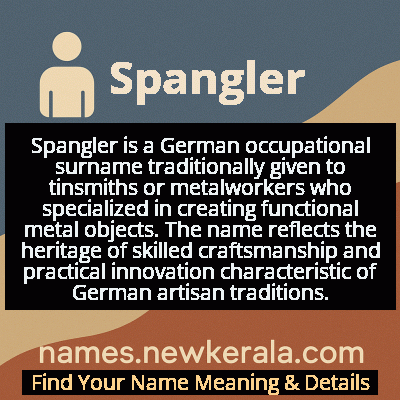Spangler Name Meaning & Details
Origin, Popularity, Numerology Analysis & Name Meaning of Spangler
Discover the origin, meaning, and cultural significance of the name SPANGLER. Delve into its historical roots and explore the lasting impact it has had on communities and traditions.
Name
Spangler
Gender
Male
Origin
German
Lucky Number
2
Meaning of the Name - Spangler
Spangler is a German occupational surname traditionally given to tinsmiths or metalworkers who specialized in creating functional metal objects. The name reflects the heritage of skilled craftsmanship and practical innovation characteristic of German artisan traditions.
Spangler - Complete Numerology Analysis
Your Numerology Number
Based on Pythagorean Numerology System
Ruling Planet
Moon
Positive Nature
Diplomatic, friendly, artistic, empathetic.
Negative Traits
Over-sensitive, moody, indecisive, prone to self-pity.
Lucky Colours
Green, cream, white.
Lucky Days
Monday.
Lucky Stones
Pearl, moonstone.
Harmony Numbers
1, 3, 4.
Best Suited Professions
Diplomats, mediators, caregivers, artists.
What People Like About You
Cooperative spirit, friendliness, artistic talent.
Famous People Named Spangler
Henry Spangler
Inventor/Businessman
Co-inventor of the first commercially successful electric vacuum cleaner
John Spangler
Inventor
Developed early chewing gum formulations and manufacturing processes
William Spangler
Military Officer
Union Army colonel who commanded Pennsylvania regiments during Civil War
George Spangler
Farmer/Historic Site Owner
Owned the Spangler Farm used as a field hospital during Battle of Gettysburg
Name Variations & International Equivalents
Click on blue names to explore their detailed meanings. Gray names with will be available soon.
Cultural & Historical Significance
The name's persistence across centuries demonstrates how occupational identities became deeply embedded in family lineages, with the Spangler surname serving as a living testament to the artisan class that formed the economic backbone of many German communities. As German immigrants brought the name to America, it became part of the rich tapestry of ethnic surnames that contributed to the nation's industrial and technological development, particularly in Pennsylvania Dutch country where many Spanglers settled and continued their metalworking traditions. The name thus represents both Old World craftsmanship and New World adaptation, bridging European artisanal traditions with American industrial progress.
Extended Personality Analysis
Individuals bearing the Spangler name are often associated with traits reflecting their artisan heritage: precision, practicality, and mechanical aptitude. The occupational roots suggest a personality inclined toward hands-on problem-solving, attention to detail, and a methodical approach to tasks. Historically, tinsmiths needed both creative vision to design functional objects and technical skill to execute them flawlessly, implying that Spanglers might possess a balanced combination of artistic sensibility and analytical thinking.
This heritage suggests individuals who value craftsmanship quality, take pride in their work, and demonstrate reliability in their personal and professional relationships. The name's connection to metalworking—a trade requiring patience, strength, and heat resistance—hints at emotional resilience and the ability to withstand pressure while maintaining composure. Modern Spanglers might naturally gravitate toward engineering, manufacturing, or skilled trades where their innate tendency toward precision and functional design can find expression, often displaying the same dedication to quality that characterized their ancestral namesakes.
Modern Usage & Popularity
In contemporary times, Spangler remains a distinctive surname with moderate frequency, primarily found in German-American communities and throughout the United States. The name maintains its occupational resonance while adapting to modern professional contexts, with many bearers working in engineering, manufacturing, and technical fields that echo their ancestral metalworking traditions. While not among the most common German surnames, Spangler has stable usage patterns and is particularly concentrated in Pennsylvania, Ohio, and other Midwestern states with strong German heritage. The name's distinctive sound and clear occupational origins give it a certain appeal for those interested in genealogical connections to skilled trades, and recent decades have seen the name occasionally used as a first name, particularly in families seeking to honor their German heritage or appreciate its strong, technical connotations.
Symbolic & Spiritual Meanings
Symbolically, Spangler represents transformation through craftsmanship—the ability to take raw materials and shape them into functional beauty. The name embodies the metaphorical concept of 'forging' one's destiny through skill and perseverance, much like a metalsmith transforms base metal into useful objects. It carries connotations of durability, reliability, and practical wisdom—qualities essential to the artisan's trade. The tinsmith's work of joining separate pieces into unified wholes suggests symbolic meanings of connection, repair, and the creation of unity from diversity, while the metallic associations evoke strength with flexibility, the ability to be shaped while maintaining structural integrity, and the value that comes from withstanding the 'fires' of experience.

